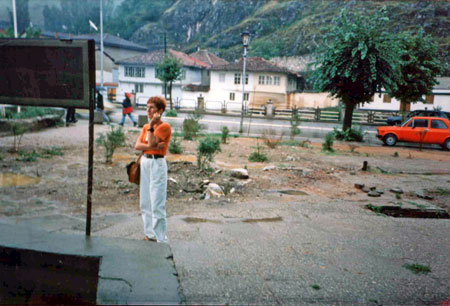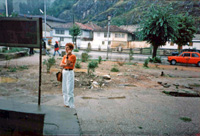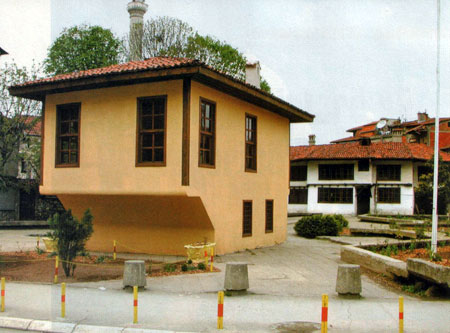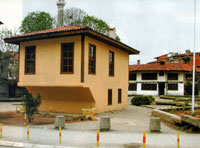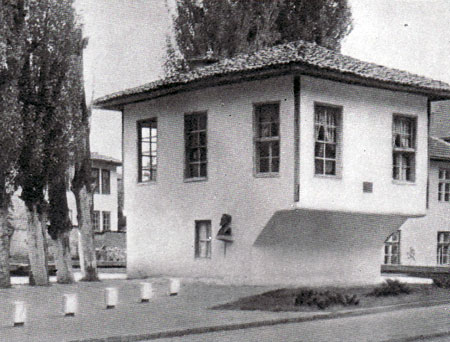| | Robert Elsie | AL Art | AL History | AL Language | AL Literature | AL Photography | Contact | |
Robert Elsie
Texts and Documents of Albanian History
BACK | AL History
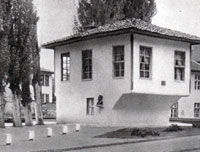
Site of the League of Prizren
(Photo: ca. 1980).
1878
The Resolutions of the League of PrizrenOn 10 June 1878, delegates from all over Albania assembled in Prizren to work out a common political platform to counter the Treaty of San Stefano and the resolutions of the Congress of Berlin, which had ignored the Albanian wish for self-determination. The League of Prizren, Alb. Lidhja e Prizrenit, no doubt initially had the tacit support of the Ottoman government. Among the most prominent participants of the League of Prizren were Abdyl bey Frashëri, Sulejman Vokshi and Ymer Prizreni. On 13 June 1878, the League submitted an eighteen-page memorandum to Benjamin Disraeli, the British representative at the Congress of Berlin, announcing: “Just as we are not and do not want to be Turks, so we shall oppose with all our might anyone who would like to turn us into Slavs or Austrians or Greeks. We want to be Albanians.” The “Kararname,” resolutions of the League of Prizren, were passed and signed by forty-seven Albanian beys on 18 June 1878.
After this historic meeting, which served to promote the national awakening, Abdyl bey Frashëri returned to southern Albania where he organized a League committee and began gathering troops to oppose the annexation of the south of the country by Greece. A key assembly of Muslim and Christian landowners at the Bektashi monastery of his native village of Frashër adopted a program for autonomy, which was accepted by the League in Prizren on 27 November 1878. Its agenda was later published by Sami bey Frashëri in the Constantinople daily newspaper “Tercümân-i-Şark” (The Oriental Interpreter). In 1879, Abdyl bey travelled to Berlin, Paris, Vienna and Rome with Mehmed Ali Vrioni to seek support for the Albanian cause and to submit a memorandum of Albanian demands to the Great Powers. In mid-1880, a programme for Albanian autonomy was passed by delegates of the national movement in Gjirokastra. By the end of April 1881, the Ottoman authorities had had enough and sent in troops to quell the uprising, and the League of Prizren was suppressed.
The League of Prizren is considered the beginning of the long struggle against the Ottoman Empire and against Albania’s neighbours for the country’s self-determination and independence. The original venue of the League of Prizren is commemorated by a small museum, which has now been rebuilt, after being razed to the ground by Serb forces during the Kosova War on 27 March 1999.
The texts provided here are: 1) the sixteen-point Resolutions (Kararname) of the League, 2) the nineteen-point Instructions (Talimat) of the League on the organisation of a government administration and the creation of an army, and 3) an auxiliary eight-point Decree on the organisation of the army and its deployment.
Resolutions (Kararname) of the Prizren Committee for National Defence, signed by 47 Muslim deputies from the districts of Prizren, Gjakova, Ipek [Peja], Gucia, Yeni Pazar [Novi Pazar], Sjenica, Tashlidja [Plevlja], Mitrovica, Vuçitërn [Vushtrria], Prishtina, Gjilan, Skopje, Kalkandelen [Tetova], Kirchova [Kërçova / Kičevo], Gostivar, and Lower and Upper Dibra.
Article 1
Our league has come together to oppose any government other than that of the Sublime Porte and to defend our territorial integrity by all possible means.Article 2
It is our most earnest intention to preserve the imperial rights of our Lord, the irresponsible person of His Highness the Sultan. We will therefore regard as foes of our nation and fatherland all those who counteract this intention and cause a disturbance, as well as all those who endeavour to weaken the authority of the Government and those who assist in such endeavours, until they mend their ways, and we will eject from our territories those who make trouble for the loyal inhabitants of the country.Article 3
We will willingly accept delegates from other districts who wish to join our League and will register them in the national list as friends of the Government and the country.Article 4
In accordance with our noble religious law (sheriat), we will protect the lives, property and honour of our loyal non-Muslim compatriots as our own, but yet we will act against rebels and punished them according to circumstance and venue.Article 5
All expenditures for the troops to be mustered by the districts will be covered under directives to be issued. Auxiliary troops from abroad will be gratefully welcomed into our ranks.Article 6
In view of the situation in the Balkans, we will not allow any foreign troops to enter our territory. We will not recognize Bulgaria and do not even wish to hear its name mentioned. If Serbia does not agree to give up the regions it has occupied illegally, we will deploy volunteer corps (akindjiler) against it and do our utmost to bring about the return of these regions. We will do the same with Montenegro.Article 7
We will support our fellow countrymen and those faithful to the Government in the Balkans who have shown that they support our League. We will assist one another in times of need. There will be no lack of mutual support and understanding.Article 8
Should one district encounter opposition in carrying out the objectives of the League, the neighbouring districts will come to its aid and will provide requisite support to achieve the desired objectives.Article 9
Anyone who leaves our League, anyone who – God forbid – commits the crime of espionage against it, and anyone who does not obey the orders of his superiors, will be given the punishment he deserves.Article 10
Should the inhabitants of the districts that joined the League, whoever they be and whatever religion they follow, choose to leave our League, they may not go over to Serbia or Montenegro. Should anyone do so nonetheless, he will be declared a spy and will be punished according to the laws in force.Article 11
Anyone of us who has been entrusted with competencies from our League and does not carry out his duties properly, neglects them or absents himself from them, or who misuses his office or official power in any manner, or who behaves brutally or causes dishonour, will be publicly exposed and punished accordingly, and his property will be confiscated.Article 12
Marching orders for the troops, conscription, use of the forces and other such matters will be specified in special regulations to be set forth.Article 13
Great attention is to be paid to documents and written correspondence to ensure that these orders and directives are clearly followed.Article 14
It is understood that the Government may not interfere in the affairs of the League. Accordingly, the League will not interfere in the administrative affairs of the Government, unless the latter can be shown to have issued orders involving the use of force.Article 15
A copy of these resolutions will be presented wherever necessary.Article 16
In accordance with the covenant of the League that we deputies of the undaunted men of northern Albania, Epirus and Bosnia have contracted – men who have known nothing but arms since their birth and who are willing to shed their blood for the Empire, their nation and their fatherland - we have selected Prizren as the capital of the League, As soon as the League is functioning successfully, we will nevermore allow a tyrant to oppress us and the inhabitants of our districts. After us, this League will be taken over by our children and grandchildren. Whoever abandons it, will be treated as if he had abandoned our Islamic faith and will be the object of our curses and scorn. We pledge that we will carry out the provisions of our Resolutions faithfully and give witness thereto with our signatures.Instructions (Talimat) from the Albanian League on the organization of the administration and the creation of its army. The League assumes the functions of a government.
Article 1
In implementation of the Resolutions of the League, a central administration will be set up in the town of Prizren, consisting of persons elected as the best representatives of each sandjak governing the administration of all the kazas. In turn, local branches of the central administration will be set up in each kaza, using the most capable figures of the towns and municipalities thereof. In their written correspondence with one another, the members of this administration will use their personal seals.
Site of the League of Prizren, razed
by Serb forces on 27 March 1999
(Photo: Robert Elsie, July 1999).Article 2
Apart from the deputies sworn in by the central administration, all the other functionaries will return to their homes and set up local branches of administration for the kazas as soon as possible, and, within a period of 10-15 days, will make ready the armed forces mustered there. To this end, they are to inform the central administration of the sandjaks of their activities, and act according to the responses they receive from it.Article 3
Each kaza is to [recruit] the requisite number of soldiers in two phases and ensure that they be made ready for duty.Article 4
In addition, should any of the local branches of the administration require armed forces, each kaza will second regular troops to the place in question, corresponding to the number of soldiers they have registered and who are able to bear arms.Article 5
Should our enemies attack before the Congress [of Berlin], currently underway, takes its decisions, the nearest kazas are to second a sufficient number of troops, recruiting them in a mass call-up. The kazas not situated in the immediate vicinity of the fighting are to second their regular troops to the regions in question without delay, as soon as they are so informed hereof by the central administration,Article 6
The head of command, major and other officers of the army, that is to be set up in an orderly fashion in line with the registry carried out in each region, will be appointed with the approval of the local population.Article 7
The local branches of administration in the sandjaks and kazas must carry out a detailed check of the number of soldiers at their disposal, and none of the officers is to offer any opposition to this.Article 8
As soon as the deputies return to their homes, they are to carry out a detailed inventory of the amounts and kinds of weapons available to the population of each kaza, and are to inform the central administration thereof.Article 9
All men of the kaza deemed fit for military service shall be sent into battle immediately. Should any of these men refuse to go to battle, or should they set off and harm the local population on their way, or flee from the battlefield, their houses will be burnt down or, according to the gravity of the offense, they will be sentenced to death or deported to some distant region where they will do their military service in the ranks of the regular army. Should there be men among them who have no houses and who go into hiding at the homes of their relatives or in houses of other people, the owners to these homes giving shelter to them will be severely punished in line with the gravity of the offense.Article 10
Should a soldier from a kaza flee the battlefield, or while on marching orders, take refuge in another kaza, the local population of that kaza must arrest him immediately and hand him over to the local authorities. If the people of that kaza hide him, they will be severely punished.Article 11
The members of the councils of elders, together with the imams and muftis of each town, village and hamlets in the kaza, are to provide detailed information, without any exception, on the number of men capable of bearing arms in their villages and hamlets. Anyone not obeying this regulation or abusing his authority will be severely punished.Article 12
Each officer, irrespective of rank, is to provide his commanding officer with the exact number of registered and trained soldiers under his orders. Should he not inform his superior or exaggerate the number of men under his command, he will be punished for abuse of power.Article 13
Committees for the distribution of booty are to be set up in the military camps that are to conduct an inventory of the booty and distribute animals captured from the enemy as booty during the fighting.Article 14
Should at any given time one or more units sent from camp into battle capture animals as booty, this booty must be divided up in front of a special committee and shared with the other units that did not capture any booty, the distribution being made on the basis on the number of rifle-bearing men. The aforementioned committees must hand over the respective portion of the animals to the officers to be distributed to the surviving soldiers or to the families of those who fell in battle that day. Soldiers who remained at the camp and did not take part in the fighting will not receive any animals captured from the enemy. Should the soldiers who originally seized the booty be put to flight and other soldiers come to their rescue, defending them and saving the seized animals, they will have a right to be counted in the distribution of the booty like the original soldiers. All other objects taken from the enemy as booty, aside from the animals, will belong to the person who captured them.Article 15
Should an officer or a soldier send home any animals that were seized from the enemy as booty, instead of handing them over to the booty committee, the local branch of the kaza administration will seize the animals and send them back to the camp. In such a case, the soldier having committed this offense forfeits his right to any of the booty.Article 16
For the period during which the League is active, the local branches of the administration for each kaza may recruit and employ as many people as they need.Article 17
Beasts of burden, ammunition and other military equipment needed by the army that are to be provided by each kaza will be made available with the approval and by decision of the local branches of the kaza administration.Article 18
Should any officer, irrespective of rank, be relieved of his duties because of an offense he has committed, another capable officer will be chosen and appointed to replace him, with the approval of all the members of the committee set up to this end, made up of other officers of the division in question.Article 19
With regard to military organisation, each company must be composed of one hundred men, and have a captain, a lieutenant, five sergeants, ten corporals and one emin [keeper of accounts]. Four companies of infantry and one company of cavalry, a total of five hundred men, will make up a battalion that will have one commander, one deputy commander, one imam, one battalion secretary and a sufficient number of flag-bearers. The beasts of burden of the battalion are to be incorporated into the cavalry units. For every four battalions there will be a colonel, a regiment secretary and a lieutenant-colonel, and the forces of two colonels will be commanded by a general. Wages and other requisites for these officers will be regulated by State instructions for the regular army. It was noted above that a commander and the officers under his orders will have at their disposal five hundred men, but if needs be, this number may be reduced to three hundred. A person commanding over 2,500 men will have the rank of a general.Decree on the organization of the army and the deployment of its units where they are needed.
Article 1
To defend the regions of Gucia [Gusinje] and Rugova, 2,000 soldiers from Gjakova are to be seconded to Gucia and 1,000 from Peja are to be seconded to Rugova. All these soldiers belong to the Kosova division.Article 2
Since Gjakova has enough forces to defend itself, 1,000 men are to be recruited in Novi Pazar and seconded to defend Kolashin [Kolašin].
Article 3
Since the local population is not in a position to defend Çajnica [Čajniče], Tashlidja [Pljevlja] and Foça [Foča], 2,000 men from the Novi Pazar army are to be sent those regions.Article 4
An army is also to be formed in Herzegovina. The troops of this army will consist of 30,000 men recruited from the population of the Sandjak of Hercegovina and troops mustered in Sarajevo. This army will defend the region from Gacko to Trebinje.Article 5
The region from Banja to Priboj will be defend by the army of Novi Pazar which, if needs be, will do battle with the enemy in this area. It will merge in Priboj with the army of Sarajevo.
Reconstructed site of the League of
Prizren (Photo: Robert Elsie, 2003).
Article 6
Another army is to be formed in Novi Pazar. This army will consist of Albanians, excluding the inhabitants of the Sandjak itself, and will reach a level of 20,000 men, not counting the inhabitants of the region, who will supplement this army.Article 7
An army, made up of Albanians, is to be formed in Kosova. This army will defend the region from Mitrovica to the kaza of Gjilan and will join forces with the army of Skopje in that area. It will consist of 70,000 men.Article 8
An army is also to be formed in Skopje that will march on Palanka with a view to joining forces with the army of Kosova. It will consist of 40,000 men. The Shkodra Corps will consist of 30,000 men. Thus, the total number of troops in the national army (not including the Sarajevo Corps) will reach 190,000, divided into 380 battalions (150,200 infantrymen and 39,800 cavalrymen).We hereby sign and place our seals to these Instructions consisting of nineteen articles and to this Decree consisting of eight articles, passed with our approval, so that the institutions concerned act in full accord with the contents thereof and that the provisions thereof be kept in force in wartime and in peacetime.
5/18 June 1878
/47 signatures/
The representative of Upper Dibra, Mirmiran Iljaz,
The representative of Gjakova, Mirmiran Abdullah,
The representative of Tetova, the noble Fevzi Rexhep,
The representative of Tetova, Mehmet Esat (seal missing),
The representative of Tetova, Hasan Masharnuredin, mirallaj,
The representative of Upper Dibra, the noble Mehmet Sadik,
The representative of Prizren, the noble Hajrulla Nursin,
The representative of Luma near Prizren, the noble Mehmet,
The representative of Mat, the noble Hasan Riza,
The representative of Ohrid, the nobel Mehmet Reshat,
The representative of Skopje, the noble Adburrahmen Sirri,
The representative of Skopje, the noble Mustafa Sabri,
The representative of Peja, the noble … Halil,
The representative of Lower Dibra, the noble Ahmet Sabri,
The representative of Mitrovica, the noble Osman Ali,
The representative of Prishtina, the noble Esseid Mehmet,
The representative of Yeni Pazar [Novi Pazar], Ali,
The representative of Yeni Pazar [Novi Pazar], Ejup,
The representative of Mitrovica, Osman Qahil [Qamil?],
The representative of Sjenica, Mustafa Abdu,
The representative of Sjenica, Masharnuredin Zejnelabedin,
The representative of Prizren, Murteza,
The representative of Tashlidja [Plevlja], the Musfti Esseid Mehmet Nuredin,
The representative of Prizren, Abdylhalim Nefi,
The representative of Prizren, Himi S[…],
The representative of Vushtrria, Hysein Shaip,
The representative of Gjakova, Mehmet,
The representative of Peja, Hamdi Shaban,
The representative of Dibra, Molla Iljaz,
The representative of Dibra, Bajram Masharnuredin,
The representative of Dibra, Enver Ismail Minhel [Binhel?]
The representative of Dibra, Mehmet
The representative of Tetova, Abdurreuf [Abdyl Reuf?],
The representative of Tetova, Sadik,
The representative of Tetova, Mehmet,
The representative of Gostivar, el-Haxhi Zylbehar,
The representative of Skopje, Esseid Mehmet Xheladin,
The representative of Skopje, Jashar,
The representative of Gjakova, Mehmet Kahreman,
The representative of Gjakova, Syleiman Vokshi [seal missing],
The representative of Peja, Zejnel,
The representative of Peja, Iljaz,
The representative of Peja, Sali,
The representative of Kërçova, Ahmet Syla,
The representative of Gjilan, Sahit,
The representative of Gjilan, Rashit,
The representative of Vushtrria, Kadri,
The representative of Vushtrria, Ilmi Abdurrahman,
The representative of Gucia, Ibrahim Lutfi Masharnuredin,
The representative of the Catholic population of Prizren [name and seal missing].
[from: HHStA, Vienna, Consulate of Shkodra, Note 64, AIH, A-VI-10, p. 73-77. Appendix to a report by Austro-Hungarian consul Jelinek of Prizren, to Consul Lippich in Shkodra, 13 July 1878; Akte të Rilindjes Kombëtare Shqiptare, 1878-1912 (Tirana: Instituti i Historisë 1978), p. 40-48; and La Ligue albanaise de Prizren, 1878-1881 (Tirana: Institut d’Histoire 1988), p. 55-65. Translated from the German, Albanian and French by Robert Elsie. The original Ottoman Turkish version is missing.]
TOP
